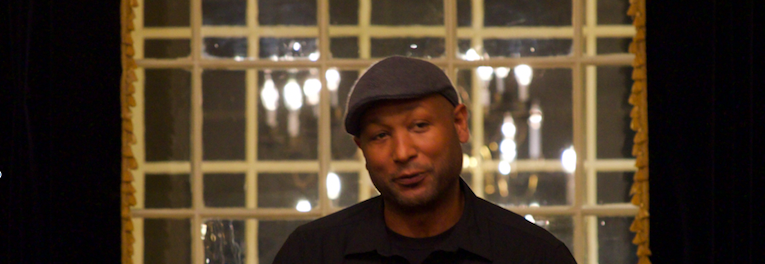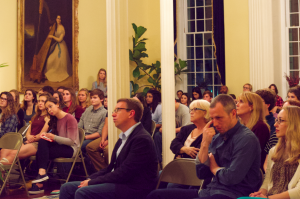
T. Geronimo Johnson Reads from Braggsville
March 14, 2017 | news, readings

Standing at the podium in Randolph Hall, T. Geronimo Johnson reads the first chapter of his most recent novel, Welcome to Braggsville. Johnson forgoes the microphone, his voice resounding throughout the room. When he finishes, he tells the audience, “I want to thank you for not laughing at that first part.”
The start of the novel de tails the beginnings of the main character’s nicknames and their evolutions throughout his childhood into his first day of his first semester at college.
tails the beginnings of the main character’s nicknames and their evolutions throughout his childhood into his first day of his first semester at college.
“The thing about that first sentence,” he says, “and I know that sometimes people are laughing because they have a nervous reaction, but the thing about that first sentence is that even though it lists his nicknames, there are these epithets that are never meant to be humorous. . . . The audience laughing at that part and the noise throws me off my game a little bit, and I find myself asking the audience not to laugh, which is this thing you’re never supposed to do.”
Johnson is an MFA graduate of the Iowa Writers’ Workshop and is a former Stegner Fellow. His first book, Hold It ‘Til It Hurts, was a PEN Faulkner Finalist. He currently teaches writing at the University of California at Berkeley.
Laura Cannon, an MFA student at CofC, introduced Johnson and described how she “fell in love with the ambition of Geronimo’s sentence level attention to language. The syntax breathed aloud and the paragraphs were like spoken word.”
Throughout the reading, Johnson takes questions and requests from the audience, making the event a space of conversation.
The first question from the audience asks about Johnson’s fears of isolating the reader and any anxiety experienced when thinking about the reader who may have a different perspective from himself.
“I’m always afraid to isolate my reader,” Johnson says. “It’s not a party to stand up here and read a sentence that is someone teasing a kid because of his suspected sexual orientation. I always have anxiety about that, and one of the things that’s driving me as a writer is this question of how you learn to care about someone who’s not yourself, someone who’s not like you, which I feel is an increasingly pressing and important question.”
He describes the third space and how he wanted the reader to have more of an experience, to enter the novel differently than his first novel.
“There’s a lot that goes unannounced or unexplained,” Johnson says. “That’s why there are no quotation marks to blur this line between what is said and what is thought or what people are thinking about and what they will admit to. I’m often thinking about that space.”
Another question from the audience asked about his attention to language and the rhythms of his sentences, about the poetic inspirations for his work and how poetry influenced his prose.
“I started as a poet, and then I say that I left poetry for the smart people to do, which I actually mean literally. I don’t mean that as any kind of backhanded compliment. I mean that literally. I didn’t think I could accomplish my particular aims as a writer in poetry, and I also was trying to work with narratives that depict human experience in ways I couldn’t figure out how to do effectively in poetry.”
Johnson explains how the he pays attention to the sonic qualities of the language and how words have “shapes and vibrations and they affect your body.” The attention to language is based on how the audience will react to these words, the sounds, the syntax.
During the reading, Johnson honors audience members’s requests for sections and chapters (sometimes entire chapters) and answers questions about lawn jockeys, Ishi, religion, storytelling, and writing as it pertains to the human experience.
“Throughout history, we look at The Illiad, The Odyssey, myths, fairytales, we have this practice of telling stories. In most religious practices, you’ll see a lot of narratives are used to help people understand the nuance of certain lessons. In the past when you were in an oral society and you had a storyteller, that storyteller had to tell a story that would help everyone remember who they are, what they’re doing, what the history of the society is, so the story is kind of a way of holding society together.”
Print, he says, changes the way we record history, how we remember our stories. “Print liberates us from the past because print now means that we’re able to record what we need to remember about yesterday. The way I think of it as a writer and as a human is that storytelling is an essential and central human activity. It’s the central activity. I think that what we have is an opportunity if we stop and think about it to be a lot more influential than we may realize in how things unfold by being more tended to some of our pressing concerns in everything that we write.”
As he concludes the reading with the section about the Charlies, the lawn jockeys, Johnson adds one last sentiment to the audience. “I think this is where we are. We’ve inherited this world and we all have to decide individually whether or not we’re going to do anything to make it better.”

